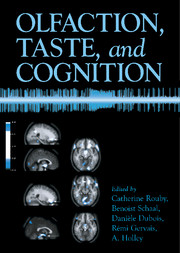Book contents
- Frontmatter
- Contents
- Contributors
- Preface
- Acknowledgments
- A Tribute to Edmond Roudnitska
- OLFACTION, TASTE, AND COGNITION
- Section 1 A Specific Type of Cognition
- Section 2 Knowledge and Languages
- 4 Names and Categories for Odors: The Veridical Label
- 5 Nose-wise: Olfactory Metaphors in Mind
- 6 Linguistic Expressions for Odors in French
- 7 Classification of Odors and Structure–Odor Relationships
- Section 3 Emotion
- Section 4 Memory
- Section 5 Neural Bases
- Section 6 Individual Variations
- Index
- References
4 - Names and Categories for Odors: The Veridical Label
Published online by Cambridge University Press: 21 September 2009
- Frontmatter
- Contents
- Contributors
- Preface
- Acknowledgments
- A Tribute to Edmond Roudnitska
- OLFACTION, TASTE, AND COGNITION
- Section 1 A Specific Type of Cognition
- Section 2 Knowledge and Languages
- 4 Names and Categories for Odors: The Veridical Label
- 5 Nose-wise: Olfactory Metaphors in Mind
- 6 Linguistic Expressions for Odors in French
- 7 Classification of Odors and Structure–Odor Relationships
- Section 3 Emotion
- Section 4 Memory
- Section 5 Neural Bases
- Section 6 Individual Variations
- Index
- References
Summary
The research presented here is aimed at clarifying the relationships between cognitive categories and the naming of odors, our method being a close analysis of the verbal answers given to odorants presented in various experiments. This is part of a work in progress within a cognitive science research program on categorization. By definition, such a program is multidisciplinary, involving chemistry, neurophysiology, psychology, and, in this case, an emphasis on psycholinguistics and linguistics. The concerns of these latter two disciplines led us to pay special attention to the conceptualizations and wording chosen for odors. We shall focus on the verbal answers given by subjects: On the one hand, they are considered as direct and obvious, like any other outputs or responses from the cognitive system in any experimental setting, like neural or behavioral responses; on the other hand, they may be scored at the same time as “erroneous.” The questions raised by this ambiguity when scoring verbal answers in olfactory research led to examination of some theoretical issues regarding the conceptual representation of “an odor” in human memory, as compared with the descriptions of odorants in the natural sciences.
Odors and Their Names
When scoring the verbal performances of subjects in identification tasks and in diagnostic tests, words such as “orange,” “apple,” and “vanilla” are considered the “correct odor names” or the “veridical labels” (e.g., Engen, 1987; Doty, 1992). However, little consideration has been given to what, precisely, a “word” is and what it means to researchers and subjects.
- Type
- Chapter
- Information
- Olfaction, Taste, and Cognition , pp. 47 - 66Publisher: Cambridge University PressPrint publication year: 2002
References
- 38
- Cited by

